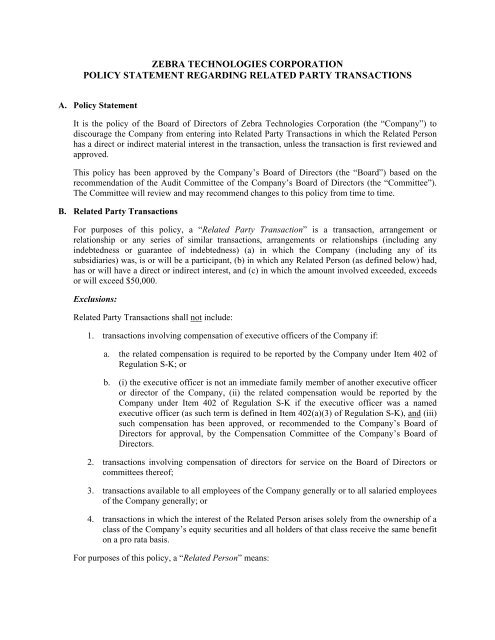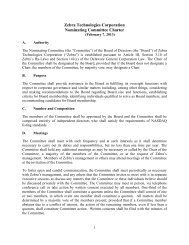Related Party Transactions Policy - Investor Relations - Zebra
Related Party Transactions Policy - Investor Relations - Zebra
Related Party Transactions Policy - Investor Relations - Zebra
- No tags were found...
You also want an ePaper? Increase the reach of your titles
YUMPU automatically turns print PDFs into web optimized ePapers that Google loves.
ZEBRA TECHNOLOGIES CORPORATION<br />
POLICY STATEMENT REGARDING RELATED PARTY TRANSACTIONS<br />
A. <strong>Policy</strong> Statement<br />
It is the policy of the Board of Directors of <strong>Zebra</strong> Technologies Corporation (the “Company”) to<br />
discourage the Company from entering into <strong>Related</strong> <strong>Party</strong> <strong>Transactions</strong> in which the <strong>Related</strong> Person<br />
has a direct or indirect material interest in the transaction, unless the transaction is first reviewed and<br />
approved.<br />
This policy has been approved by the Company’s Board of Directors (the “Board”) based on the<br />
recommendation of the Audit Committee of the Company’s Board of Directors (the “Committee”).<br />
The Committee will review and may recommend changes to this policy from time to time.<br />
B. <strong>Related</strong> <strong>Party</strong> <strong>Transactions</strong><br />
For purposes of this policy, a “<strong>Related</strong> <strong>Party</strong> Transaction” is a transaction, arrangement or<br />
relationship or any series of similar transactions, arrangements or relationships (including any<br />
indebtedness or guarantee of indebtedness) (a) in which the Company (including any of its<br />
subsidiaries) was, is or will be a participant, (b) in which any <strong>Related</strong> Person (as defined below) had,<br />
has or will have a direct or indirect interest, and (c) in which the amount involved exceeded, exceeds<br />
or will exceed $50,000.<br />
Exclusions:<br />
<strong>Related</strong> <strong>Party</strong> <strong>Transactions</strong> shall not include:<br />
1. transactions involving compensation of executive officers of the Company if:<br />
a. the related compensation is required to be reported by the Company under Item 402 of<br />
Regulation S-K; or<br />
b. (i) the executive officer is not an immediate family member of another executive officer<br />
or director of the Company, (ii) the related compensation would be reported by the<br />
Company under Item 402 of Regulation S-K if the executive officer was a named<br />
executive officer (as such term is defined in Item 402(a)(3) of Regulation S-K), and (iii)<br />
such compensation has been approved, or recommended to the Company’s Board of<br />
Directors for approval, by the Compensation Committee of the Company’s Board of<br />
Directors.<br />
2. transactions involving compensation of directors for service on the Board of Directors or<br />
committees thereof;<br />
3. transactions available to all employees of the Company generally or to all salaried employees<br />
of the Company generally; or<br />
4. transactions in which the interest of the <strong>Related</strong> Person arises solely from the ownership of a<br />
class of the Company’s equity securities and all holders of that class receive the same benefit<br />
on a pro rata basis.<br />
For purposes of this policy, a “<strong>Related</strong> Person” means:
1. any person who is, or at any time since the beginning of the Company’s last fiscal year was,<br />
a director or executive officer of the Company or a nominee to become a director of the<br />
Company;<br />
2. any person who is known to be the beneficial owner of more than 5% of any class of the<br />
Company’s voting securities;<br />
3. any “immediate family member” of any of the foregoing persons, which means any child,<br />
stepchild, parent, stepparent, spouse, sibling, mother-in-law, father-in-law, son-in-law,<br />
daughter-in-law, brother-in-law, or sister-in-law of the director, executive officer, nominee or<br />
more than 5% beneficial owner, and any person (other than a tenant or employee) sharing the<br />
household of such director, executive officer, nominee or more than 5% beneficial owner; 1<br />
and<br />
4. any firm, corporation or entity in which any of the foregoing persons is a general partner or<br />
principal or in a similar position, or in which such person, together with all other <strong>Related</strong><br />
Persons, have in the aggregate a 10% or greater beneficial ownership interest.<br />
D. Notice of Potential <strong>Related</strong> <strong>Party</strong> <strong>Transactions</strong>.<br />
Each director, nominee, executive officer and other employee of the Company that is a <strong>Related</strong><br />
Person (each, a “Reporting Person”) shall notify the Company’s General Counsel (the “General<br />
Counsel”) 2 as soon as reasonably practicable about any potential <strong>Related</strong> <strong>Party</strong> <strong>Transactions</strong> that he<br />
or she proposes to enter into, or of which he or she becomes aware, including potential <strong>Related</strong> <strong>Party</strong><br />
<strong>Transactions</strong> involving an immediate family member or an entity with which the Reporting Person or<br />
an immediate family member is affiliated.<br />
It is the responsibility of each Reporting Person to advise his or her immediate family members of<br />
this <strong>Policy</strong> and to promptly report to the General Counsel any proposed or actual <strong>Related</strong> <strong>Party</strong><br />
Transaction relating to the Reporting Person or an immediate family member of him or her. On an<br />
annual basis, each Reporting Person shall confirm in writing to the General Counsel that he or she has<br />
disclosed to the General Counsel all actual or future potential <strong>Related</strong> <strong>Party</strong> <strong>Transactions</strong> for the<br />
individual or any immediate family member of the individual.<br />
At the time the Company becomes aware of a person being a <strong>Related</strong> Person by reason of the person<br />
beneficially owning 5% or more of a class of the Company’s voting securities, the General Counsel<br />
shall request that the person comply with this policy in the same manner as directors, nominees,<br />
executive officers and other employees that are <strong>Related</strong> Persons are required to comply.<br />
E. Independence of Non-employee Directors.<br />
1 The relatives listed are deemed to be “immediate family members” only if they: (1) are currently related to the<br />
primary reporting person (e.g., a person who is divorced from a director’s daughter would no longer be a son-inlaw<br />
whose transactions must be reported); and (2) are related by blood or a step relationship to either the primary<br />
reporting person or the primary reporting person’s spouse (e.g., the sister of a director’s spouse is considered a<br />
sister-in-law for purposes of this item; the sister’s husband, however, is not considered a brother-in-law for<br />
purposes of this item).<br />
2 If a potential <strong>Related</strong> <strong>Party</strong> Transaction involves the General Counsel, then the Chief Financial Officer shall act in<br />
the role of General Counsel under this <strong>Policy</strong> with respect to the <strong>Related</strong> <strong>Party</strong> Transaction. If the Chief Financial<br />
Officer also is involved in the potential <strong>Related</strong> <strong>Party</strong> Transaction, then the Chair shall retain outside counsel to<br />
act in the role of General Counsel under this <strong>Policy</strong> with respect to the <strong>Related</strong> <strong>Party</strong> Transaction.<br />
2
Each non-employee director (and each nominee) of the Company shall use his or her best efforts to<br />
not engage and not permit any of his or her immediate family members to engage in any transaction<br />
with the Company that may adversely impact the Board’s determination that he or she is an<br />
independent director (or nominee). Such transactions include any transaction in which the director<br />
(or nominee), or an immediate family member of the director (or nominee), is a partner in, or a<br />
controlling shareholder or an executive officer of, any organization to which the Company made, or<br />
from which the Company received, payments for property or services in the current or any of the past<br />
three fiscal years that exceed 5% of the recipient's consolidated gross revenues for that year, or<br />
$200,000, whichever is more. They also include any transaction in which the director (or nominee)<br />
or an immediate family member of the director (or nominee) is an executive officer of a charitable<br />
organization to which the company makes payments in excess of the greater of 5% of the charity's<br />
revenues or $200,000.<br />
Each non-employee director (and each nominee) of the Company shall notify the General Counsel of<br />
any potential or proposed or actual transactions described in this Section E.<br />
The Company shall not make any contribution, or pledge of contribution, to a charitable or non-profit<br />
organization in an amount in excess of $200,000 for any year unless it first determines that such<br />
contribution would not adversely affect the determination that any director (or nominee) is an<br />
independent director under the applicable rules of The NASDAQ Stock Market. When assessing<br />
director independence, consideration shall be taken of other situations in which the director (or<br />
nominee) or any of his or her immediate family members and the Company each have a relationship<br />
with the same charity.<br />
F. Determination of <strong>Related</strong> <strong>Party</strong> <strong>Transactions</strong>.<br />
The General Counsel shall determine whether a potential <strong>Related</strong> <strong>Party</strong> Transaction of which he is<br />
informed constitutes a <strong>Related</strong> <strong>Party</strong> Transaction that requires compliance with this policy and/or<br />
disclosure as a <strong>Related</strong> <strong>Party</strong> Transaction under applicable regulatory rules. If the General Counsel<br />
determines that the potential <strong>Related</strong> <strong>Party</strong> Transaction constitutes such a <strong>Related</strong> <strong>Party</strong> Transaction,<br />
the transaction will be subject to review in accordance with Section G of this policy. The General<br />
Counsel may, as he deems appropriate, provide relevant details and analysis of the <strong>Related</strong> <strong>Party</strong><br />
Transaction for consideration by the party conducting such review.<br />
G. Review and Approval Procedures<br />
<strong>Related</strong> <strong>Party</strong> <strong>Transactions</strong> that are identified as such prior to the consummation thereof or<br />
amendment thereto shall be consummated or amended only if the following steps are taken:<br />
1. The director, nominee, executive officer, employee that is a <strong>Related</strong> Person or beneficial<br />
owner that is the subject <strong>Related</strong> Person or is related to the subject <strong>Related</strong> Person shall<br />
provide notice to the General Counsel prior to such <strong>Related</strong> Person entering into the <strong>Related</strong><br />
<strong>Party</strong> Transaction. Such notice shall describe the facts and circumstances of the proposed<br />
<strong>Related</strong> <strong>Party</strong> Transaction, including: (i) the <strong>Related</strong> Person’s relationship to the Company<br />
and interest in the transaction, and (ii) the material facts of the proposed <strong>Related</strong> <strong>Party</strong><br />
Transaction, including the proposed aggregate value of such transaction, the terms of any<br />
credit extended by the Company and, in the case of indebtedness, the amount of principal<br />
that would be involved.<br />
2. If the General Counsel determines that the proposed transaction is a <strong>Related</strong> <strong>Party</strong><br />
Transaction and involves less than $100,000, the General Counsel in conjunction with the<br />
Chair of the Committee (who will possess delegated authority to act on behalf of the<br />
3
Committee for these cases), and such other executive officers that either of them may deem<br />
appropriate or the full Committee at the option of the Chair, shall consider all of the relevant<br />
facts and circumstances available and approve or disapprove the transaction.<br />
3. If the General Counsel determines that the proposed transaction is a <strong>Related</strong> <strong>Party</strong><br />
Transaction and involves $100,000 or more, the proposed <strong>Related</strong> <strong>Party</strong> Transaction shall be<br />
submitted to the Committee for consideration at the next Committee meeting or, in those<br />
instances in which the General Counsel, in consultation with the Chief Executive Officer or<br />
the Chief Financial Officer, determines that it is not practicable or desirable for the Company<br />
to wait until the next Committee meeting, to the Chair of the Committee (who will possess<br />
delegated authority to act on behalf of the Committee between Committee meetings).<br />
4. The General Counsel, the Committee, or where submitted to the Chair, the Chair, shall<br />
consider all of the relevant facts and circumstances available to the Committee or the Chair,<br />
including (if applicable) but not limited to: (i) the benefits to the Company; (ii) the impact on<br />
a director’s independence in the event that the <strong>Related</strong> Person is a director, an immediate<br />
family member of a director or an entity in which a director is a partner, shareholder or<br />
executive officer; (iii) the availability of other sources for comparable products or services;<br />
(iv) the <strong>Related</strong> Person’s interest in the transaction; (v) the terms of the transaction; and (vi)<br />
the terms available to unrelated third parties or to employees generally (including, in the case<br />
of the extension of credit by the Company or any of its subsidiaries to a <strong>Related</strong> Person,<br />
whether the extension is to be made (a) on the same terms as other loans and in accordance<br />
with underwriting procedures used for other loans, (b) does not involve more than the normal<br />
risk of repayment, and (c) does not present other unfavorable terms). No member of the<br />
Committee shall participate in any review, consideration or approval of any <strong>Related</strong> <strong>Party</strong><br />
Transaction with respect to which such member or any of his or her immediate family<br />
members is the <strong>Related</strong> Person. The Committee or Chair, as applicable, shall convey its<br />
decision to the General Counsel, who shall convey the decision to the appropriate persons<br />
within the Company.<br />
5. The Chair of the Committee shall report to the Committee at the next Committee meeting<br />
any approval under this policy pursuant to delegated authority.<br />
Pre-Approved <strong>Transactions</strong>:<br />
The Audit Committee has reviewed the types of <strong>Related</strong> <strong>Party</strong> <strong>Transactions</strong> described below and<br />
determined that each of the following <strong>Related</strong> <strong>Party</strong> <strong>Transactions</strong> shall be deemed to be pre-approved<br />
by the Committee, even if the aggregate amount involved will exceed $100,000:<br />
1. Certain <strong>Transactions</strong> with Other Companies. Any transaction with another company at<br />
which a <strong>Related</strong> Person’s only relationship is as an employee (other than an executive<br />
officer), director or beneficial owner of less than 5% of that company’s shares (i) if the<br />
aggregate amount involved does not exceed the greater of $1,000,000, or 2 percent of that<br />
company’s total annual revenues; (ii) the <strong>Related</strong> Person has no direct or indirect<br />
involvement in the <strong>Related</strong> <strong>Party</strong> Transaction; and (iii) the <strong>Related</strong> Person is not<br />
compensated for the transaction with the Company or its subsidiary.<br />
2. Certain Company Charitable Contributions. Any charitable contribution, grant or<br />
endowment by the Company to a charitable organization, foundation or university at which a<br />
<strong>Related</strong> Person’s only relationship is as an employee (other than an executive officer) or a<br />
director, if the aggregate amount involved does not exceed the lesser of $100,000, or 2<br />
percent of the charitable organization’s total annual receipts.<br />
4
No further action need be taken by the Committee under this <strong>Policy</strong> with respect to the above preapproved<br />
transactions.<br />
Ongoing <strong>Transactions</strong>:<br />
If a <strong>Related</strong> <strong>Party</strong> Transaction that is identified to the General Counsel as such after the initiation of<br />
the <strong>Related</strong> <strong>Party</strong> Transaction and such <strong>Related</strong> <strong>Party</strong> Transaction has not been previously approved<br />
or previously ratified under this policy, then:<br />
1. If the transaction is pending or ongoing, it will be submitted to the Committee or Chair of the<br />
Committee promptly, and the Committee or Chair shall consider all of the relevant facts and<br />
circumstances available to the Committee or the Chair, including (if applicable) but not<br />
limited to: the benefits to the Company; the impact on a director’s independence in the event<br />
that the <strong>Related</strong> Person is a director, an immediate family member of a director or an entity in<br />
which a director is a partner, shareholder or executive officer; the availability of other sources<br />
for comparable products or services; the <strong>Related</strong> Person’s interest in the transaction; the terms<br />
of the transaction; and the terms available to unrelated third parties or to employees generally.<br />
Based upon the conclusions reached, the Committee or the Chair shall evaluate all options,<br />
including but not limited to ratification, amendment or termination of the <strong>Related</strong> <strong>Party</strong><br />
Transaction; and<br />
2. If the transaction is completed, the Committee or Chair of the Committee shall evaluate the<br />
transaction, taking into account the same factors described above, to determine if rescission<br />
of the transaction and/or any disciplinary action is appropriate, and shall request that the<br />
Chief Compliance Officer evaluate the Company’s controls and procedures to ascertain the<br />
reason that the transaction was not submitted to the Committee or Chair for prior approval<br />
and whether any changes to these procedures are recommended.<br />
H. Annual Review of Ongoing <strong>Transactions</strong><br />
At the Committee’s first meeting of each fiscal year, the Committee shall review any previously<br />
approved or ratified <strong>Related</strong> <strong>Party</strong> <strong>Transactions</strong> that remain ongoing or remaining amounts payable to<br />
or receivable from the Company. Based upon all relevant facts and circumstances, taking into<br />
consideration the Company’s contractual obligations, the Committee shall determine if it is in the<br />
best interests of the Company and its stockholders to continue, modify or terminate the <strong>Related</strong> <strong>Party</strong><br />
Transaction.<br />
I. Disclosure<br />
All <strong>Related</strong> <strong>Party</strong> <strong>Transactions</strong> that are required to be disclosed in the Company's filings with the<br />
Securities and Exchange Commission, as required by the Securities Act of 1933 and the Securities<br />
Exchange Act of 1934 and related rules and regulations, shall be so disclosed in accordance with such<br />
laws, rules and regulations.<br />
The material features of this policy shall be disclosed in the Company’s annual report on Form 10-K<br />
or in the Company’s annual meeting proxy statement, as required by applicable laws, rules and<br />
regulations.<br />
J. Application<br />
The requirements and procedures set forth in this <strong>Policy</strong> are supplemental to, and are not intended to<br />
replace or supersede, any other policies or procedures of the Company that require any governing<br />
5
ody or an officer of the Company to review and/or approve transactions or that may apply to <strong>Related</strong><br />
<strong>Party</strong> <strong>Transactions</strong>. Directors and all employees shall continue to adhere to their obligations and<br />
responsibilities under any other policies and procedures. Notwithstanding the foregoing, a <strong>Related</strong><br />
<strong>Party</strong> Transaction approved pursuant to Section G of this <strong>Policy</strong> need not be approved pursuant to the<br />
“Conflicts of Interests” section of the Company’s Code of Business Conduct.<br />
6






